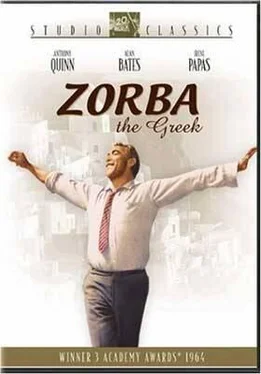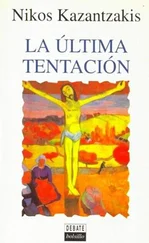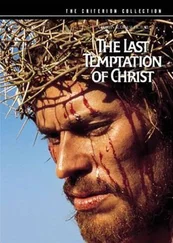Nikos Kazantzakis - Zorba The Greek
Здесь есть возможность читать онлайн «Nikos Kazantzakis - Zorba The Greek» весь текст электронной книги совершенно бесплатно (целиком полную версию без сокращений). В некоторых случаях можно слушать аудио, скачать через торрент в формате fb2 и присутствует краткое содержание. Жанр: Современная проза, на английском языке. Описание произведения, (предисловие) а так же отзывы посетителей доступны на портале библиотеки ЛибКат.
- Название:Zorba The Greek
- Автор:
- Жанр:
- Год:неизвестен
- ISBN:нет данных
- Рейтинг книги:3 / 5. Голосов: 1
-
Избранное:Добавить в избранное
- Отзывы:
-
Ваша оценка:
- 60
- 1
- 2
- 3
- 4
- 5
Zorba The Greek: краткое содержание, описание и аннотация
Предлагаем к чтению аннотацию, описание, краткое содержание или предисловие (зависит от того, что написал сам автор книги «Zorba The Greek»). Если вы не нашли необходимую информацию о книге — напишите в комментариях, мы постараемся отыскать её.
Zorba The Greek — читать онлайн бесплатно полную книгу (весь текст) целиком
Ниже представлен текст книги, разбитый по страницам. Система сохранения места последней прочитанной страницы, позволяет с удобством читать онлайн бесплатно книгу «Zorba The Greek», без необходимости каждый раз заново искать на чём Вы остановились. Поставьте закладку, и сможете в любой момент перейти на страницу, на которой закончили чтение.
Интервал:
Закладка:
"Zorba! Zorba!" I shouted. "That's enough!"
At last Zorba crouched on the ground, out of breath. His face was shining and happy. His grey hairs were sticking to his forehead and the sweat, mixed with coal-dust, was running down his cheeks and chin.
I bent over him anxiously.
"I feel better for that," he said, after a minute, "as if I had been bled. Now I can talk."
He went back to the hut, sat in front of the brazier and looked at me with a radiant expression.
"What came over you to make you dance like that?"
"What could I do, boss? My joy was choking me. I had to find some outlet. And what sort of outlet? Words? Pff!"
"What joy?"
His face clouded over. His lip began to tremble.
"What joy? Well, what you said to me a moment ago, you said… just like that, in the air? You didn't understand it yourself? We didn't come here for the coal, you told me. That's what you said, didn't you? We came here to while away the time and lead them up the wrong track so that they shouldn't take us for lunatics and sling tomatoes at us! But when we're alone together and nobody can see us, we can laugh and enjoy ourselves! Isn't that right? I swear that's what I wanted, too, but I didn't realize it properly. Sometimes I thought of the coal, sometimes of old Bouboulina, sometimes of you… a regular muddle. When I was picking out a gallery, I said: It's coal I want! And from head to heel I became coal. But afterwards, when the work was finished, when I was skylarking with that old sow-good luck to her!-I said, let all the sacks of lignite and all the bosses go hang-by the little ribbon round her neck-and Zorba with them! Then when I was alone and had nothing to do, I thought of you, boss, and my heart melted. It weighed on my conscience. 'It's disgraceful, Zorba,' I'd cry, 'disgraceful for you to go and fool that good man and eat up all his money. When'll you stop being a rotter, you Zorba, you'? I've had enough of you!' I tell you, boss, I didn't know where I was. The devil was dragging me one way, God the other; and, between the two of them, they split me down the middle. Now, bless you, boss, you've said a great thing and I can see it all clearly now. I've seen, I've understood! We're agreed! Let's get cracking! How much money have you got left? Hand it over! Let's eat it up!"
Zorba mopped his brow and looked around. The remains of our dinner were still lying on the little table. He reached for them with his long arm.
"With your permission, boss," he said. "I'm hungry again."
He took a slice of bread, an onion and handful of olives.
He ate voraciously, tipped up the calabash, and the red wine gurgled down his throat without the calabash touching his lips. Zorba clicked his tongue; he was satisfied.
"That's better," he said.
He winked at me and asked:
"Why don't you laugh? Why d'you look at me like that? That's how I am. There's a devil in me who shouts, and I do what he says. Whenever I feel I'm choking with some emotion, he says: 'Dance!' and I dance. And I feel better! Once, when my little Dimitraki died, in Chalcidice, I got up as I did a moment ago and I danced. The relations and friends who saw me dancing in front of the body rushed up to stop me. 'Zorba has gone mad!' they cried, 'Zorba has gone mad!' But if at that moment I had not danced, I should really have gone mad-from grief. Because it was my first son and he was three years old and I could not bear to lose him. You understand what I'm saying, boss, don't you-or am I talking to myself?"
"I understand, Zorba, I understand; you're not talking to yourself."
"Another time… I was in Russia then… yes, I've been there, too, for the mines again, copper this time, near Novo Rossisk… I had learnt five or six words of Russian, just enough for my work: no; yes; bread; water; I love you; come; how much?… But I got friendly with a Russian, a thorough-going Bolshevik. We went every evening to a tavern in the port. We knocked back a good number of bottles of vodka, and that put us into high spirits. Once we began to feel good we wanted to talk. He wanted to tell me everything that had happened to him during the Russian revolution, and I wanted to let him know what I had been up to… We had got drunk together, you see, and had become brothers.
"We had come to an arrangement as well as we could by gestures. He was to speak first. As soon as I couldn't follow him, I was to shout: 'Stop!' Then he'd get up and dance. D'you get me, boss? He danced what he wanted to tell me. And I did the same. Anything we couldn't say with our mouths we said with our feet, our hands, our belly or with wild cries: Hi! Hi! Hop-la! Ho-heigh!
"The Russian began. How he had taken a rifle; how war had spread; how they arrived in Novo Rossisk. When I couldn't follow any more, I cried: 'Stop!' The Russian straight away bounded up, and away he went dancing! He danced like a madman. And I watched his hands, his feet, his chest, his eyes, and I understood everything. How they had entered Novo Rossisk; how they had looted shops; how they had gone into houses and carried off the women. At first the hussies cried and scratched their own faces with their nails and scratched the men, too, but gradually they became tamed, they shut their eyes and yelped with pleasure. They were women, in fact…
"And then, after that, it was my turn. I only managed to get out a few words-perhaps he was a bit dense and his braín didn't work properly-the Russian shouted: 'Stop!' That's all I was waiting for. I leapt up, pushed the chairs and tables away and began dancing. Ah, my poor friend, men have sunk very low, the devil take them! They've let their bodies become mute and they only speak with their mouths. But what d'you expect a mouth to say? What can it tell you? If only you could have seen how the Russian listened to me from head to foot, and how he followed everything! I danced my misfortunes; my travels; how many times I'd been married; the trades I'd learned-quarrier, miner, pedlar, potter, comitadji, santuri-player, passa-tempo hawker, blacksmith, smuggler-how I'd been shoved into prison; how I escaped; how I arrived in Russia…
"Even he, dense as he was, could understand everything, everything. My feet and my hands spoke, so did my hair and my clothes. And a clasp-knife hanging from my waistband spoke, too. When I had finished, the great blockhead hugged me in his arms; we filled up our glasses with vodka once more; we wept and we laughed in each other's arms. At daybreak we were pulled apart and went staggering to our beds. And in the evening we met again.
"Are you laughing? Don't you believe me, boss? You're saying to yourself: Whatever are these yarns this Sinbad the Sailor is spinning? Is it possible to talk by dancing? And yet I dare swear that's how the gods and devils must talk to each other.
"But I can see you're sleepy. You're too delicate. You've no stamina. Go on, go to sleep, and tomorrow we'll speak about this again. I've a plan, a magnificent plan. I'll tell you about it tomorrow. I'm going to smoke one more cigarette. I may even take a dip in the sea. I'm on fire. I must put it out. Good night!"
I was a long time getting to sleep. My life is wasted, I thought. If only I could take a cloth and wipe out all I have learnt, all I have seen and heard, and go to Zorba's school and start the great, the real alphabet! What a different road I would choose. I should keep my five senses perfectly trained, and my whole body, too, so that it would enjoy and understand. I should learn to run, to wrestle, to swim, to ride horses, to row, to drive a car, to fire a rifle. I should fill my soul with flesh. I should fill my flesh with soul. In fact, I should reconcile at last within me the two eternal antagonists.
Sitting on my mattress, I thought of my life which was being completely wasted. Through the open door I could just discern Zorba by the light of the stars. He was crouching on a rock, like a night bird. I envied him. It is he who has discovered the truth, I thought. His is the right path.
Читать дальшеИнтервал:
Закладка:
Похожие книги на «Zorba The Greek»
Представляем Вашему вниманию похожие книги на «Zorba The Greek» списком для выбора. Мы отобрали схожую по названию и смыслу литературу в надежде предоставить читателям больше вариантов отыскать новые, интересные, ещё непрочитанные произведения.
Обсуждение, отзывы о книге «Zorba The Greek» и просто собственные мнения читателей. Оставьте ваши комментарии, напишите, что Вы думаете о произведении, его смысле или главных героях. Укажите что конкретно понравилось, а что нет, и почему Вы так считаете.












